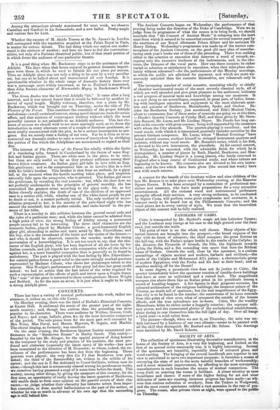CONCERTS.
There has been a variety of musical performances this week, rather un- common, it strikes us, on this side Easter.
On Monday evening, there was the third of Hullah's Historical Concerts, at Exeter Hall It embraced the music of the greater part of the eight- eenth century; and, though less curious than the preceding, was more popular in its character. There were anthems by Weldon, Greene, Croft, and Boyce; and gongs, ballads, glees, &c. by the most favourite composers of the period. The solo pieces were for the most part well executed by Mrs. Weiss, Iffiss Duval, and Messrs. Manvers, W. Seguin, and Machin. The choral singing, as formerly, was excellent.
On the same evening, the Beethoven Quartet Society commenced per- formance in the "Beethoven Rooms" in Harley Street. This society— founded by the late Mr. Alsager, for the special purpose of doing honour to the composer by the study and practice of his quartets, the most pro- found and elaborate (especially the latest ones) of his works—has now been committed to the direction of M. Rousselot; to whom, indeed, the ex- cellence of the performances has been due from the beginning. Three quartets were played: the very first (in F) that Beethoven ever pub- lished; the third of the Rasnmoffsky set, written in the middle of his career; and the one in E flat dedicated to Count Gallitzin, written near its close,—though this last is erroneously classed among his posthumous works, we ourselves having possessed a copy of it some time before his death. This society, among other things, by giving the amateurs of this country, for the first time, an opportunity of really hearing the latest quartets of Beethoven, will enable them to form some opinion on the guess& vemata of their cha- racter,—to judge, whether their obscurity has hitherto arisen from imper- fect execution, or from morbid hallucination on the part of the author, or whether he was so much in advance of his own age that the succeeding age is still behind him.
The Ancient Concerts began on Wednesday; the performance of that evening being under the direction of the Duke of Cambridge. Were we to judge from its programme of what the season is to bring forth, we should couclude that "the Concert of Ancient Music" is relapsing into the inert state from which it seemed to be somewhat roused for several seasons past by the eiertions of our Royal dilettante Prince Albert and his assistant Sir Henry Bishop. Wednesday's programme was made up of the merest com- monplace of the Ancient Concerts, on the good old easy plan of manufac- turing each year's books out of those of the preceding. There was nothing either in the selection or execution that deserves a word of remark, ex- cepting only the excessive loudness of the instruments, and, in the cho- ruses, the thinness of the vocal parts. How can these concerts be either varied in selection or satisfactory in execution, when they take place abso- lutely without rehearsal?—for the performances of the Monday mornings, to which the public are admitted for payment, and which are more nu- merously attended than the concerts themselves, are rehearsals only in name.
The increasing number of serial concerts, consisting wholly or chiefly of chamber instrumental music of the most severely classical style, all of which are well attended and give great pleasure to the audiences, indicates a real progress of musical taste and knowledge among our amateurs. It is a new thing to see assemblages, composed, in great part, of ladies, listen- ing with intelligent attention and enjoyment to the most elaborate quar- tets and quintets of Beethoven, Mendelssohn, Spohr, and Onslow. Be- -sides the Beethoven Society, just mentioned, and Ella's Musical Union, about to commence, four of these series of concerts are going on at this time, —Dando's Quartet Concerts at Crosby Hall, and those given by Mr. Stern- dale Bennett, Mr. Lucas, and Mr. Lindsay Sloper. Mr. Dando has long car- ried on his concerts with great success; being well supported by the amateurs with whom the City abounds. The quartet-playing is excellent; and the vocal music, with which it is intermixed, generally includes novelties by the present German composers. Mr. Lucas, whose "Musical Evenings" have lasted several seasons, confines himself to stringed instrument quartets and quintets, without any vocal music. Mr. Bennett's series, which is his first, is devoted to his own instrument, the pianoforte. At his second concert, on Wednesday, he executed, with the admirable finish for which he is distinguished, a number of pieces by Bach, Handel, Beethoven, and Men- delssohn. Mr. Lindsay Slopes is a young pianist, who lately returned to England after a long course of Continental study, and whose talents are beginning to be known. His concerts also are devoted to his own instru- ment; and the two which have been given (the second last week) have met with much success.


























 Previous page
Previous page